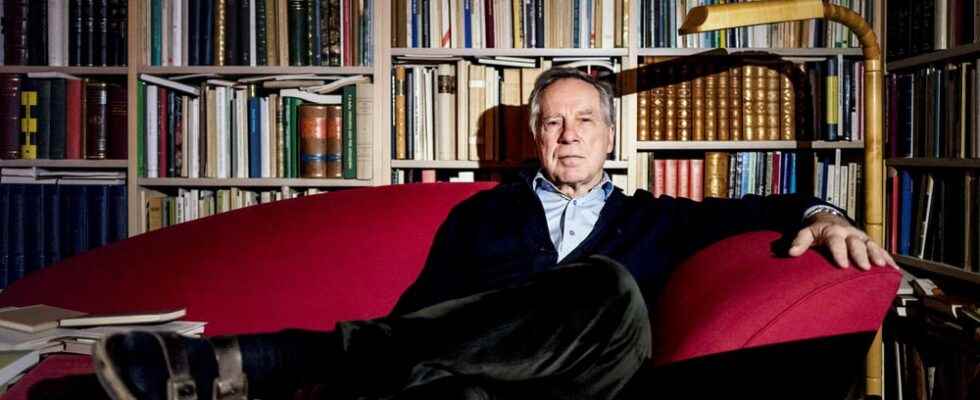Gunnar Broberg’s attitude was contained in the at the same time humble and exalted smile. Whatever came up, and it could be just about anything, there was another place to see it from. There is always something bigger than what our poor gaze can capture. All we know is that we can never know everything.
Maybe that attitude came all the way from the rectory at home in Sörmland after the war. The creator is great. The step was not so far to Linnaeus, whose view of man became his dissertation in Uppsala, “Homo Sapiens L.” (1976). After studying this Swedish great creator for six decades, his Linnaeus biography was completed, “The man who arranged nature” (2019).
Gunnar spoke softly, applicant. In conversation he could hum and look into the distance as if in wonder. On the podium, he could sometimes seem insecure, shy. History too is great.
He was more interested in the part than in the whole. Maybe that’s why he got so many awards. The books are all inviting, generous. As a reader, you are lured further into the crowd. Like Alice in Wonderland. He wrote about the deviant: monsters, nasty types, pills and panaceae. His friends were the animals, the reindeer, the lynx, the wolverine, the giraffes at Hagenbeck’s zoo. He thrived among natural cabinets and herbariums, and moved like a weasel among the small print in Carolina Rediviva’s hideouts.
He thrived among natural cabinets and herbariums, and moved like a weasel among the small print in Carolina Rediviva’s hideouts.
He stopped at the mystery, the incomparable. Wrote “The Cat’s History” (2004). So “History of the Night” (2016). We could get the history of the steering wheel, the history of the hat … He was a different person, wrote about the anti-substances. The peculiarity of things was his path to context. He received the August Prize for a collection of works, “Gyllene äpplen” (1991), Swedish texts through a thousand years.
Few have like Broberg lived up to Abraham Flexner’s motto, “the usefulness of useless knowledge”. From Linnaeus’ Old Testament avenging God – quite peripheral in the welfare state – he went to rest theories. By the time the debate on sterilization broke out, his free basic research had gained political momentum. He wrote “Unwanted in the Folkhemmet” (1991) with Mattias Tydén. Was commissioned in the sterilization investigation and published a book in the USA, “Eugenics and the welfare state” (1996). He entered the worldview of the Anthropocene early on with “The Tsunami in Lisbon” (2005). Towards the end, he expertly and thoughtfully commented on statue topples in front of the media near and far.
When the Linnaeus Society’s yearbook landed on the hall floor, I have in all years started from behind, with Gunnar’s “notices and messages”, a cavalcade of Kleinkunst, dilettantism in the good sense of the word that points to love and care. At the bottom of the lyrics was the seriousness and compassion for the victims. In “Was Linnaeus Racist?” (2020), he lets his life’s work meet world politics’ Black lives matter, in full sympathy. But adds “that history can not be about ‘pure’ people, because then no one belongs there”. “Against slavery!” (2020) is a reminder that the moral moment of history is always now.
The Linnaeus biography crowned one of our finest writings in the field of non-fiction. He broke all the rules, which it can do that know them completely. One third of the text is quotes. It is splendid, stops at details, repeats itself, loses the lines, is not held together by any thesis or theory. That’s why it’s a wonderful book. It is its own field of gravity, through the empathy of all the weaknesses and greatnesses that were Linnaeus’ life. A little exemplary, perhaps, but Gunnar Broberg wrote it, and everything else he wrote, with the understanding and tenderness that every human being deserves.
We met in Lund just days before the death of a European humanities conference. Told what we wrote on. Suddenly we took each other’s hands, held them for a long time. His was strangely warm and soft.
Gunnar Broberg 1942–2022
Historian of scienceprofessor of history of ideas and learning at Lund University, author.
Dedicated a large part of his academic career to study Carl von Linné but was also noted for his research on the racial biology institute and forced sterilization in Sweden.
Received many awards and awards, including the August Prize 1992 for his book “Golden Apples”, the Society of the Nine Special Prize 2005 and the Great History Prize 2020.
Show more
